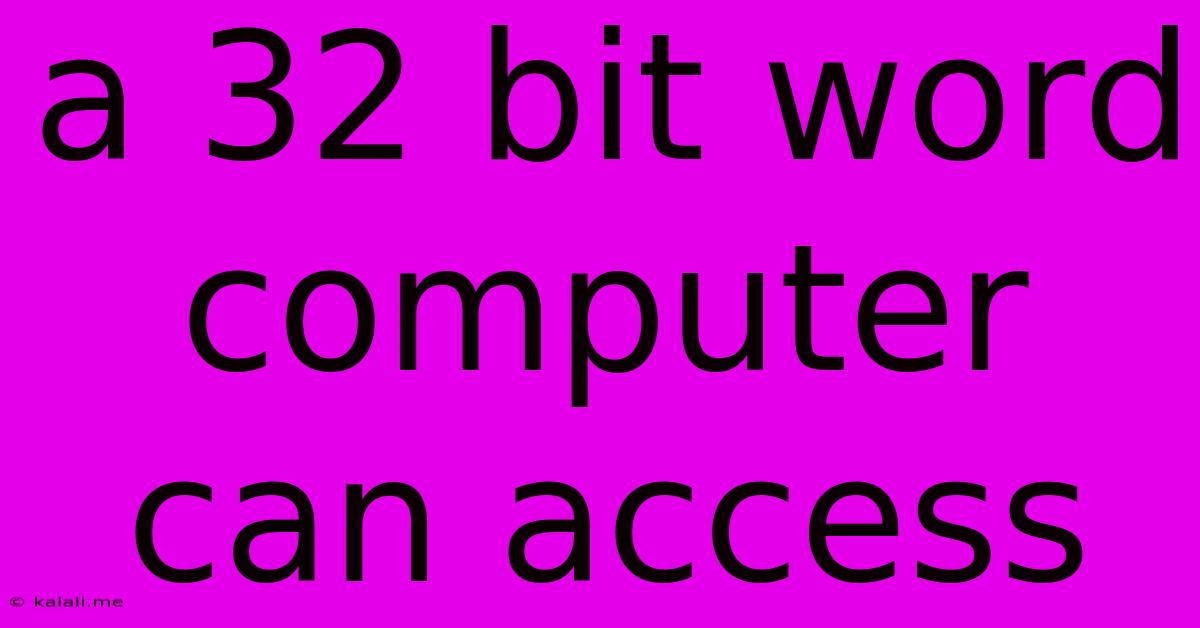A 32 Bit Word Computer Can Access
Kalali
Jun 13, 2025 · 3 min read

Table of Contents
What Can a 32-Bit Word Computer Access? Understanding Memory Addressing and Limitations
The term "32-bit word computer" refers to a computer architecture where the central processing unit (CPU) processes data in units of 32 bits at a time. This seemingly small detail significantly impacts the computer's capabilities, particularly its ability to access memory. This article will explore the memory addressing limitations of a 32-bit system and what this means for the amount of RAM and other resources it can directly address.
This article will delve into the technical aspects of 32-bit memory addressing, explain its limitations concerning RAM capacity, and discuss the implications for modern computing. We'll also look at how this impacts file sizes, program capabilities, and the overall user experience.
Understanding Memory Addressing
At the heart of the 32-bit limitation lies the concept of memory addressing. Each byte of RAM has a unique address, allowing the CPU to locate and access specific data. In a 32-bit system, the CPU uses a 32-bit address bus to specify these addresses. This means that the maximum number of unique addresses it can generate is 2<sup>32</sup>.
The 4GB RAM Limit: A Common Misconception (and Reality)
This 2<sup>32</sup> addressable locations translates to 4,294,967,296 bytes, or approximately 4 gigabytes (GB) of RAM. However, this is a simplification. In reality, a 32-bit system typically only directly addresses about 3.5 GB to 4 GB of RAM due to memory mapping for hardware and the operating system. This is often referred to as the 4GB RAM limit, though realistically it's slightly less. Attempting to install more RAM than the system can directly address will often result in the system only recognizing the addressable amount.
Implications Beyond RAM
While the RAM limitation is the most prominent consequence, the 32-bit architecture's limitations extend beyond just memory. This includes:
-
File Size Limitations: While modern operating systems often employ techniques to handle larger files, the underlying 32-bit addressing can still cause issues with very large files, potentially leading to instability or incompatibility.
-
Program Size Limitations: Similarly, the size of programs that can be run directly is affected. Larger programs might require more memory or encounter difficulties with address space allocation.
-
Overall Performance: While not directly related to addressing, the limited processing power associated with older 32-bit processors can also lead to performance bottlenecks, especially when working with large datasets or demanding applications.
The Transition to 64-Bit Systems
The limitations of 32-bit systems paved the way for the widespread adoption of 64-bit architectures. 64-bit systems utilize a 64-bit address bus, dramatically increasing the number of addressable memory locations to 2<sup>64</sup>, essentially eliminating practical limits on RAM size. This allows for significantly larger programs, files, and overall system capabilities.
Conclusion
A 32-bit word computer can directly access approximately 4 GB of RAM, a limit imposed by its 32-bit addressing capabilities. This limitation affects not only RAM but also impacts file sizes, program size and overall performance. While workarounds exist, the transition to 64-bit systems has largely addressed these limitations, allowing for more powerful and versatile computing experiences. Understanding these constraints is crucial for appreciating the advancements in computer architecture and the capabilities of modern systems.
Latest Posts
Latest Posts
-
Our Living Islands Ireland Apply Online
Jun 14, 2025
-
Application To Bank For Bank Statement
Jun 14, 2025
-
How Many Factors Does The Number 121 Have
Jun 14, 2025
-
University Of Hawaii Acceptance Rate Out Of State
Jun 14, 2025
-
What Part Of Speech Is Hard
Jun 14, 2025
Related Post
Thank you for visiting our website which covers about A 32 Bit Word Computer Can Access . We hope the information provided has been useful to you. Feel free to contact us if you have any questions or need further assistance. See you next time and don't miss to bookmark.